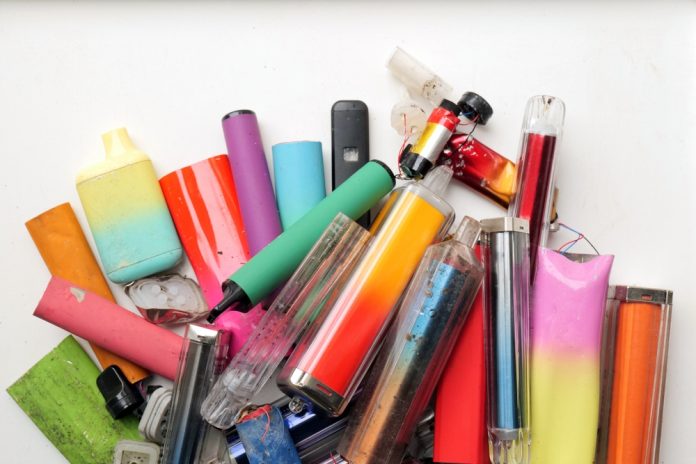Parliament has laid new legislation to ban the sale of single-use vapes from 1 June 2025, Circular Economy Minister Mary Creagh confirmed today.
Single-use vapes are not rechargeable or refillable and are typically discarded as general waste in a bin or littered rather than recycled – contributing to a flood of litter on our streets.
Even when sent to recycling facilities, they usually have to be disassembled by hand – a slow and difficult process that will make it difficult to keep up with the pace of vape production.
Worryingly, their lithium-ion batteries can also present a fire risk to waste industry workers.
How the ban helps meet recycling and circular economy goals
Last year, it was estimated that almost five million single-use vapes were littered or thrown away in general waste every week in the UK, almost four times as much as the previous year and the equivalent of eight being thrown away per second.
In 2022, more than 40 tonnes of lithium from single-use vapes was discarded, the same amount used to power 5,000 electric vehicles.
Making the sale of single-use vapes illegal delivers on the Government’s commitment to act on this important issue, kick-starts the push towards a circular economy and helps curb the rise of young people taking up vaping while protecting our natural environment and town streets from a tide of litter.
Circular Economy Minister Mary Creagh said: “Single-use vapes are extremely wasteful and blight our towns and cities.
“This is the first step on the road to a circular economy, where we use resources for longer, reduce waste, accelerate the path to net zero and create thousands of jobs across the country.”
Minister for Public Health and Prevention Andrew Gwynne added: “Banning disposable vapes will not only protect the environment but importantly reduce the appeal of vapes to children and keep them out of the hands of vulnerable young people.”
Public in favour of banning single-use vapes
The public is in favour of restricting the sale and supply of single-use vapes, with 69% of consultation respondents supporting these proposals in February 2024.
Banning these vapes will prevent them from being thrown into bins with general waste, where they typically end up in landfills or being incinerated.
Due to their lithium-ion batteries, they pose a fire risk and can cause poor air quality.
Furthermore, it will stop plastic, lead, and mercury from leaching into the environment, which can cause waterways to be contaminated and poison our wildlife.
The government has laid legislation to introduce the ban, and subject to parliamentary approval, businesses will have until 1 June 2025 to sell any remaining stock they hold and prepare for the ban coming into force.
The UK and devolved governments have worked closely and will align coming into force dates.









